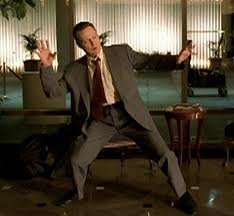I mentioned in my last post that one key to effective practice management is to limit your activities to the tasks appropriate to your role in the practice. I see this principle broken all the time in advisors practices. And it truly is one of the keys to effectiveness. But what, exactly IS the role of a financial advisor? To help frame the idea, let’s look at role playing in a context we usually associate with the term.
Think about Tom Hanks, who I enjoyed so much in things like Sleepless in Seattle, Apollo 13, and Toy Story. Now, think of him as a bad guy. 
Could you see Tom Hanks trying to play the role of the Godfather? I have difficulty doing that, but Marlon Brando had no difficulty convincing me that he was one heartless (when he needed to be), menacing capo.
Does that mean Marlon Brando was a bad person? I don’t know. He just plays a better bad guy. Could Hanks do it? Probably. He would just have to do a whole bunch of work to get there.
I’m reminded of the music video by Fatboy Slim “Weapon of Choice” featuring Christopher Walken doing a soft shoe. The first thing that struck me was: “What a twisted idea – Christopher Walken dancing through this video”. The second thing that hit me was, “Wow, that guy can dance!” What I learned later was Walken actually first went to Hollywood as a dancer, but got cast in the role of bad guy and played it so well that that’s how all of us think of him. 
Funny how playing the role so well has defined the person.
Now what does that have to do with us? Well, what so many of us don’t realize is that being a financial advisor is playing a role, and being a business leader is playing a role as well. If you think “That’s not me – I’m an advisor – I always want to be thinking of clients first, that’s who I am”, then (I know I’m going to get hate mail for this) forget about having your own firm. You won’t make it, or if you do it will be by accident. Or you will end up doing what I suggest but may not realize or admit it. But if being the advisor is what you’re exclusively committed to, go back to being somebody else’s employee, ‘cause this ain’t the right gig for you. If you’re going to be a successful business leader, you have to worry about the well-being of your firm AND the well being of your client. You MUST dedicate some time to learning about tending to your business, even if there are client issues clamoring for your attention. And, just like you studied and practiced and gradually learned the part of advisor, being successful requires that you approach being a business leader the same way.
Let me clear up the most common misunderstanding: Playing a different role doesn’t mean you have to play it all the time, and it doesn’t mean having different values, but it means being that person at the right time. Actors have this down, because they understand the concept of “being in character”. But you do it, too. Think about how firing an employee is different than disciplining your misbehaving child. You’re addressing similar problems but you approach them different ways – because its different players, it’s a different story, and you’re in different roles. Have you done both? I have. And I had to be very different people in each situation; I’m not my staff’s dad and I’m not my kids’ boss. While I have the same values all the time, I act differently, because that’s what the part calls for.
In Moss Adams’ studies of the performance of financial advisory firms, they make a conclusion that once advisory firms reach a certain size, the top firms do quite a bit better, and that they correlate that with the decision to hire professional management to come in and actually run the business. (In fact, professional management tends, in the study, to be associated with firms they describe as “market dominators” – what does THAT say to you?)
So, why do I prattle on and on about roles when I could just recommend that you take a management accounting course or go to a conference? Accepting the necessity of the role leads you to the right questions: What would the ideal leader of this business do in this situation? How would a world-class achiever in this role prepare for the performance? What skills would the best in the business have to fulfill this position?
If you can act like the successful business leader would act, you can become the successful business leader. The first step could be to write down what that ideal looks like; what the ideal would be able to accomplish. Lee Thayer, in Leadership: Thinking Being, Doing, says a “Role Description describes as best as possible what a virtuoso in that role would be able to accomplish under adversity.” Who is this person that you’re trying to be?
Patrick Lencioni, in The Four Obsessions of an Extraordinary Executive, builds a model that describes much of the role of a business leader. Much of it involves developing and overcommunicating the culture and objectives of the organization. How much time would the ideal leader of YOUR business invest doing this?
Do you feel that you cannot find time for these kinds of activities? What’s occupying all that time? And are they activities that the best leader of an advisory firm in the industry would be involved in? One of my favorite reasons for revisiting this periodically is that it helps me figure out what I need to delegate. In Leap of Strength, Walt Sutton spends a chapter on Entrepreneurs and Managers. And ever since I first read it, I have been consistently amazed at how much faster and better my client service has become since I learned how to give other people in my organization the authority and the responsibility of doing so many of the things I used to do myself. If I re-read my role description and I can’t find the activity in it, I have to get rid of it. I have no choice.


Nice concise article – love the references to sources. It’s an ongoing journey.